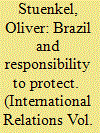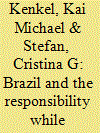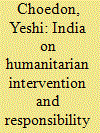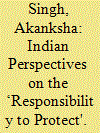|
|
|
Sort Order |
|
|
|
Items / Page
|
|
|
|
|
|
|
| Srl | Item |
| 1 |
ID:
147707


|
|
|
|
|
| Summary/Abstract |
This article questions the still broadly accepted notion that the global debate about Responsibility to Protect (R2P) is divided into a Western (or Northern) ‘pro-R2P’ camp and a non-Western (or Southern) ‘anti-R2P camp’. In the same way, the relatively broadly accepted assertion that R2P is a Western concept overlooks the important contributions developing countries have made in the creation of the norm. Brazil’s stance vis-à-vis R2P, analyzed in this article, is a powerful example of this reality, and the country has, in the past years, temporarily assumed leadership in the discussion about how to strengthen the norm. Paradoxically, Brazil’s move was widely seen as obstructionist. This points to a broader bias that tends observers not to grant non-Western powers the same agency in the creation of rules and norms. The ongoing multipolarization will force observers to correct this vision, as countries in the Global South such as China will be increasingly able to ‘act upon’ R2P, a capacity that so far has been reserved for established powers.
|
|
|
|
|
|
|
|
|
|
|
|
|
|
|
|
| 2 |
ID:
144465


|
|
|
|
|
| Summary/Abstract |
This article examines Brazil's responsibility while protecting (RwP) initiative as an example of norm sponsorship available to nonpermanent members of the Security Council. After setting the stage with Brazil's historical engagement with intervention issues, it discusses the reasons behind the Brazilian initiative. It examines RwP's key proposals and the reactions they generated. RwP's normative implications are discussed, together with an examination of the main reasons why Brazil's sponsorship of the initiative waned following its exit from the Council. Brazil's withdrawal from sponsoring RwP highlights the need for ongoing support for initiatives that seek to revive the international community's intervention practices by tackling the basic tenets of discord over R2P's implementation.
|
|
|
|
|
|
|
|
|
|
|
|
|
|
|
|
| 3 |
ID:
156973


|
|
|
|
|
| Summary/Abstract |
India’s opposition to humanitarian intervention has been influenced by its colonial experience and its predisposition towards the principles of sovereignty and non-intervention. However, India did not adopt a strident opposition in the post-Cold War due to the changed power configuration. The article discusses how India adopted a cautious approach and yet used every opportunity to remind the international community the baleful effect of intervention in the internal affairs. After securing concession to a considerable extent on the ambitious Responsibility to Protect (R2P) and when most of the countries showed an inclination to accept humanitarian intervention in the form of ‘R2P’ at the UN summit in 2005, India grudgingly went along accepting it. India participated in the deliberation on the implementation of R2P and took its stand on various crises in which R2P was evoked. The experience of NATO’s Libya operation under R2P was regarded as substantiation of India’s apprehension of the misuse of the concept, and India reverted its position to the sceptical view of humanitarian intervention/R2P. By mere complaining about the mixing of peace enforcement with peacekeeping, when the United Nations deployed ‘intervention brigade’ for the protection of civilians, India lost the opportunity to take the initiative to propose a new mechanism to deal with the humanitarian crisis in atrocious internal conflicts.
|
|
|
|
|
|
|
|
|
|
|
|
|
|
|
|
| 4 |
ID:
173228


|
|
|
|
|
| Summary/Abstract |
The concept of ‘Responsibility to Protect’ (R2P) took shape to refine the contested concept of ‘humanitarian intervention’. In the initial phase, the concept of R2P did not receive enthusiastic endorsement. Developing countries including India perceived it as a new body with the old spirit and likened it with the concept of humanitarian intervention, and this was reinforced by the US-led war against Iraq in 2003. However, the 2005 World Summit proved to be a watershed in the evolution of R2P, just as it is a landmark to understand an important phase of India’s approach to the idea. It would not be accurate to characterize India as a determined nay-sayer on R2P endorsement, particularly in view of the widely known priority India attached at the World Summit to the question of United Nations (UN) Security Council enlargement. Eventually, by 2009 (with the introduction of ‘three- pillar principles’ of R2P), India became a major proponent for the cautious and legitimate implementation of R2P. However, the experiences gained from Libya made India become a voice of caution in invoking forcible options under the R2P principle in Syria. In this article, the attempt has been made to articulate various permutations and combinations regarding India’s evolving approach to R2P on a case-by-case basis
|
|
|
|
|
|
|
|
|
|
|
|
|
|
|
|
| 5 |
ID:
151572


|
|
|
|
|
| Summary/Abstract |
Drawing on a notable example of a non-Western normative initiative, Brazil’s ‘Responsibility while Protecting’ (RwP), this article contributes to broadening the scope of the norm dynamics literature beyond its common Western-centric focus. Post-2011 Libya intervention, Brazil proposed RwP to clarify what ‘using force’ means under the Responsibility to Protect (R2P) banner, but then withdrew from visible norm sponsorship, only to return to this as part of a collective exercise to institutionalise R2P at the United Nations. First, the article highlights the significant role of non-Western agents whose contributions usually go overlooked, yet carry the highest potential to address the legitimacy deficit of norms like R2P. Second, the article proposes adding a new conceptual tool when investigating the role of agency in norm dynamics, one that incorporates a wider range of norm ‘shaping’ processes and highlights enabling, contingent circumstances. The latter, is argued, best captures the anomalies in contemporary norm contestation. This is illustrated through an empirical analysis of the conditions under which Brazil was able to advance RwP, despite the subsequent emergence of unfavourable circumstances. This article emphasises how significant an alignment of enabling circumstances is to non-Western agents in terms of shaping norm contestation and normative exercise completion.
|
|
|
|
|
|
|
|
|
|
|
|
|
|
|
|
|
|
|
|
|